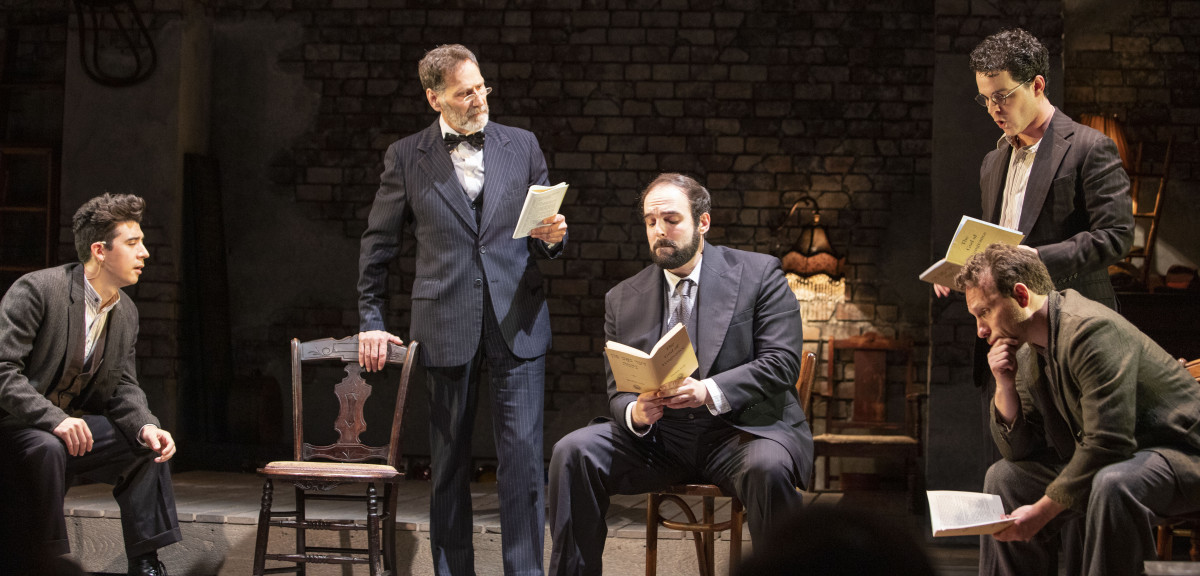Rebeca Robles, sitting on Bratton Theater’s porch in the dappled sunlight, sketched out an invisible schema in midair. The conservatory actor in Chautauqua Theater Company’s Indecent was attempting to map out her characters, using her hands to trace a sprawling tree with myriad of offshoots.
“I’ll draw a diagram for you, if you’d like, that you can put in the article,” she joked.
The characters of Paula Vogel’s Indecent are like nesting dolls, and embodying them requires layers of performance. The first layer, which anchors the show, takes the form of the ghosts of a Yiddish theater troupe. That troupe tells the story of the play The God of Vengeance, written in 1906 by Sholem Asch. Those troupe members play characters who then play other characters in a dizzying yet lovely puzzle box of a script. Indecent will close out its CTC run at 2:15 and 7:30 p.m. today at Bratton Theater.
“The great thing about this play is that it’s an ensemble,” said conservatory actor Isaiah Stavchansky. “And everyone loves to say, ‘This is an ensemble piece,’ but this play is literally about an ensemble piece. It’s an ensemble doing an ensemble.”
Robles’ way of explaining her characters is to refer to her troupe member, Chana, as an umbrella. Chana plays Madje Asch, wife of Sholem Asch; a German actress named Elsa; a Jewish immigrant actress named Reina; and an American actress named Virginia. Each of those actress characters plays Rifkele, a brothel owner’s daughter who falls in love with a sex worker named Manke, within The God of Vengeance at different times and locations.
Robles tries to feel each character in her body and apply that to each woman’s portrayal of Rifkele. Elsa leads from the head, Reina from the gut and Virginia from the heart. She thinks about the layers of these diverse women interacting with the story of The God of Vengeance. During a July 4 conversation, only three performances into Indecent’s run, Robles was in the thick of the process of bringing these characters to life.
“The thing that makes me feel at peace with maybe feeling like I’m not fully there yet, is that I am playing somebody who’s playing these characters — so it’s okay if it’s not perfect because Chana’s not perfect,” she said.
Isaiah Stavchansky is Jewish, and he grew up with the rhythms of the Yiddish language. His father’s first language was Yiddish, and his grandfather performed in Yiddish theater. Stavchansky knew exactly who Sholem Asch was, and portrays the playwright (among others, of course) in Indecent.
Stavchansky said that his characters are linked by their youth and idealism. Yet as time marches on and Asch ages, he witnesses the monstrous pogroms in eastern European Jewish communities and becomes withdrawn and disconnected from his play. The God of Vengeance was censored for obscenity when it came to Broadway in 1923 due to its depiction of Jews as brothel owners, sex workers and lesbians; Asch is largely absent from this process. Stavchansky finds additional layers of vulnerability even in that one character.
“I find that I can connect to the firebrand elements of the characters, but then as the play develops, Sholem Asch, in some ways, becomes a coward, and in some ways, realizes that he is powerless, even as the public figure that people see him as,” Stavchansky said. “I think having to realize that you are powerless is one of the hardest things about life.”
As a non-Jewish individual, conservatory actor Ellen Nikbakht wrestled with whether they were the right person for this show. Their father, however, is an immigrant from Iran, and Nikbakht plays characters who play Manke, the sex worker who falls in love with Rifkele in The God of Vengeance.
“I realized that my relationship to immigration, and obviously the queerness of it all, I found to be my way in, my door into the play,” Nikbakht said.
Ben Schrager, another conservatory actor, said he often finds himself playing characters with whom he disagrees. His characters in Indecent are mostly antagonists who take issue with The God of Vengeance, often because they object to the portrayal of Jewish people as depraved characters.
Schrager, who is Jewish, even plays the rabbi who blows the whistle on The God of Vengeance’s Broadway debut, leading to the arrest, trial and conviction of the production’s creative team and actors. He said that Vogel’s writing invites empathy for these characters; even if they might be perceived as villains, they view themselves as defending the reputation of the Jewish people in the face of rampant anti-Semitism and xenophobia. Schrager uses that impulse as his entry point.
“You have that understandable panic that so many have, especially at that time, especially when you’re talking about pogroms in Europe, the rise of fascism around the world, something that is sadly still relevant today,” Schrager said. “When you’re talking about all of those things, it is a very understandable impulse by so many people to then say, ‘Do not represent our people as prostitutes and pimps living in the slums. We need to represent our people valiantly, or else they are going to destroy us. They will use this as ammo against us.’ ”
In contrast to those characters, there is Lemml, the starry-eyed champion of the play. Portrayed by Charles Denton, Lemml is the exception to the multi-character framework. He remains constant throughout, serving as stage manager for productions of The God of Vengeance across years and continents and guiding the Indecent audience through the tale.
“I would describe Lemml as the beating heart of the play, someone who is so passionate and cares so deeply about this story, and about telling the story and allowing it to be seen,” Denton said.
Upon hearing the first reading of The God of Vengeance in Yiddish intellectual I.L. Peretz’s living room salon, Lemml was enraptured. He cried out that the play had changed his life, and from that moment on, he directed his energies toward advocating for it and for Asch.
Denton does not have to dig deep to embody Lemml’s passion. They feel about Indecent the way that Lemml feels about The God of Vengeance.
“I don’t like the term getting into character,” Denton said. “I think for me, especially for this play, it’s actually about getting out of the way. This story tells itself if you just get out of the way. I’m lucky that I relate to Lemml in that I can be infinitely passionate about something and will go to the ends of the earth to defend it.”





